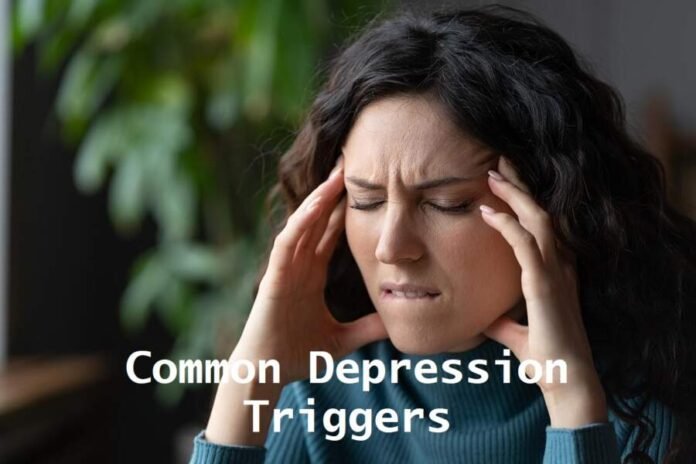These are the top 12 common depression triggers in patients. Do you or someone you know feel down or stressed? Many people experience depression, but there are ways to manage it. The World Health Organization says around 280 million people have depression. Here are 12 ways to handle common depression triggers and feel better. Also, if you know someone who is suffering from anxiety or depression, contact the helpline immediately. It is one of the most dreaded diseases in the world. You will find it very dark and dull, but it is treatable.
Grief and Loss
Grief and loss can trigger depression, but it can be challenging to diagnose because it might seem like a normal reaction to loss. Also, how people handle grief depends on their age, personality, and situation. Furthermore, grief can show up as feeling sad, anxious, or angry. It may also affect physical health, like high blood pressure, sleep problems, and changes in the immune system. Sometimes grief becomes complicated, called prolonged grief disorder, and may involve excessive rumination. Moreover, if grief feels overwhelming, it’s essential to talk to a doctor for support and help in coping with it.
Rejection
We all want to feel liked and accepted by others. Rejection or being left out can make us feel stressed and affect our self-esteem. Some people are more sensitive to rejection and pick up on even small signs of it. They feel anxious and sad if they think others don’t like them. This can lead to social withdrawal and depression. Also, even those who aren’t super sensitive can feel down after being rejected. Sometimes, people get angry or aggressive when rejected, especially if it’s from someone they like. Furthermore, it’s essential to be aware of our feelings and reactions when dealing with rejection.
Stress
Feeling stressed can be a big factor in causing depression because it affects our body and brain. When we’re stressed, our hormones change, and about 70% of depressed people experience this. The part of our brain that controls mood and emotion gets disrupted too. Stress releases a hormone called cortisol, which can change our brain cells. It can even make the hippocampus, a part of our brain, smaller. Also, depressed people often have a smaller hippocampus. Stress also affects our immune system, releasing chemicals that are linked to depression. Furthermore, these chemicals can impact our brain, including the hippocampus, and lead to mental health issues. So, managing stress is essential for mental well-being.
Illness
Certain illnesses can contribute to depression, making up about 10-15% of all depression cases. There are different reasons for this correlation: Some illnesses are very sad or traumatic, like cancer or HIV, and getting diagnosed can be tough. Also, certain illnesses themselves can cause depressive symptoms, like low thyroid levels or vitamin B12 deficiency. Furthermore, some illnesses have a natural connection to depression, like Parkinson’s disease or heart attack. Medications used to treat illnesses can also lead to depression. Illness and depression can go hand in hand.
Lack of Sleep
Sleep and depression are closely connected. Furthermore, when someone is depressed, their sleep patterns can change. They might sleep too much or not enough. In fact, about 75% of depressed people have trouble sleeping, while 40% sleep too much. Also, sleep problems are a big reason why people seek help for depression. On the other hand, a lack of sleep can also trigger depression. Not getting enough sleep increases the risk of developing depression. For example, a study with adults showed that getting five hours or less of sleep doubles the chance of having depression.
Rumination
Rumination is when grief becomes overwhelming and takes over a person’s thoughts. Instead of dealing with grief in a healthy way, they keep dwelling on it. They might ask themselves, “Why did this happen to me?” or think, “This is so terrible.” They get stuck in negative thoughts and feel sorry for themselves. Also, this can lead to depression and even thoughts of suicide. On the other hand, people who are already depressed may also start ruminating because they have trouble controlling their emotions. Rumination and depression can go hand in hand, making things even more difficult. It’s important to find healthier ways to cope with grief and sadness.
Money Problems
Money problems can make people feel very sad and stressed. A study of 35,000 Americans showed that when people have low income at home, they are more likely to have mental health issues, especially depression. Furthermore, if someone’s income drops, they become more at risk of feeling depressed. Other research also showed that money troubles and stress can lead to depression, which then makes money problems even worse, creating a bad cycle. Also, if someone is facing financial difficulties, like losing money or having less income, they should find ways to handle the stress that comes with these changes.
Life Transitions
Life changes, even good ones, can make people feel sad. People are used to their routines, so positive changes can still be stressful. For example, a job promotion may mean leaving a comfortable job for a new and challenging one, with new people and more stress. This can lead to feeling stressed and even depressed, despite the promotion being a good thing. If the life change is negative, like losing a job or going through a divorce, the stress and sadness can be even more overwhelming. Also, it can sometimes trigger depression. A known cause of the affliction.
Substance Abuse
Using drugs or alcohol and feeling depressed are closely connected. Both can cause similar changes in the body and mind. They share many risk factors and symptoms, and one can make the other worse. Furthermore, scientists have found that drug and alcohol abuse can change the way brain cells connect, leading to addiction. Also, some people use substances to try to feel better mentally, but they might not even know they have a mental health problem. They might have been living with their symptoms for a long time and think it’s normal.
Giving Birth
Giving birth can lead to depression coming back. About 1 in 9 new mothers experience postpartum depression, a type of depression that happens after birth and makes it hard for parents to care for themselves or others, as said by the Anxiety and Depression Association of America. If someone has had depression before, they are more likely to get postpartum depression. This means that getting this depression after giving birth is a relapse of depression, according to Shelton. Also, many mothers experience this. It is quite common. Doctors call it postpartum depression.
Season Changes
Certain seasons can make depressive symptoms worse and cause a relapse, known as seasonal affective disorder (SAD). SAD is more common in the fall and winter when the weather is colder and there is less daylight. However, some people can also experience seasonal depression in the summer. Also, keep in mind seasonal depression. People thought it was a myth for many years. But it is not. It is very much a real thing. Seasons do affect the mood of a person very much. Thus, beware of seasons if you have depression. And take precautions.
Important Events
Sometimes, important events can make you depressed. It is curious, but it happens. Suppose you schedule an anniversary or something else. But you cannot stop overthinking. And it eventually saps your strength. There is nothing you can do. You need to accept you can’t change certain things. Thus, try to stop overthinking. It will do you no good. Instead of that, try to change the way you think. It will help you a lot. It will give you some relief from your pain. This should be on top of your list.
Also read: 9 Helpful Hacks for Finding a Roommate Who Doesn’t Drive You Crazy







































































